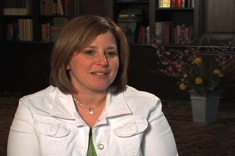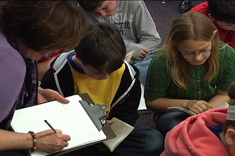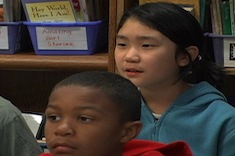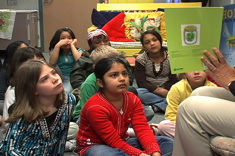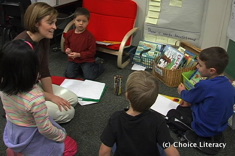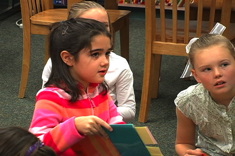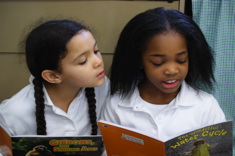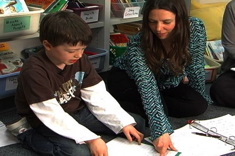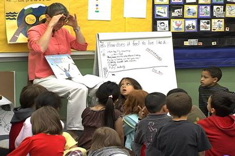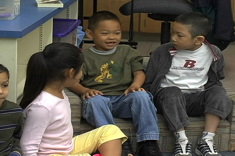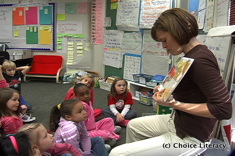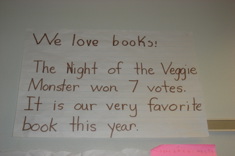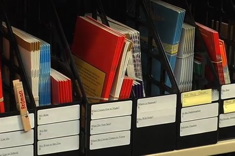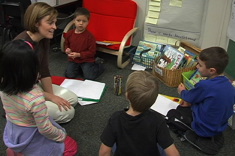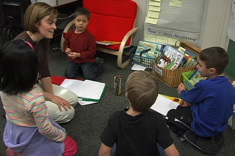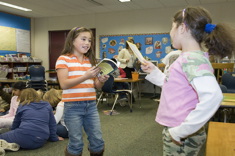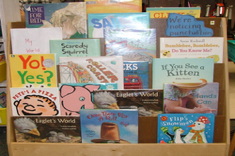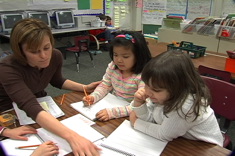2nd
Latest Content
Redesigning a Classroom: Putting Students First (and Technology in Its Place)
Mandy Robek faces the challenge of creating a warm and inviting classroom environment that still includes some cold, hard computers for student use.
Teaching Blogging to Second Graders
You’re never too young to blog, as Katie DiCesare demonstrates with her 2nd graders.
Making Connections as a Reader and a Scientist
Heather Rader finds that reading is at the heart of scientists’ work.
Quick Takes: Advice on Book Hogs
In this quick take video, Franki Sibberson gives advice for dealing with "book hogs" — those students who try to grab any new book when it appears in the classroom library.
Assessment Beyond Levels: The Reading Grid
Is there a great divide in your classroom between numerical data from assessments and your anecdotal notes? Cathy Mere bridges the gap with her class reading grid, a nifty tool for recording and analyzing a whole classroom’s worth of student assessment data on one page. A template is included.
Mentor Texts for Urban Students
What texts work best for students with urban backgrounds? Shari Frost has suggestions for teachers.
Books That Invite Thoughtful Conversation in Grades K-2
Nothing beats an engaging and fun text to spark conversations among young children. Here are some suggestions of terrific read-alouds to get the chatter started in classrooms.
Book Basket Idea: Cars and Trucks
Katie DiCesare remembers books that were fought over among the boys in her 1st grade classroom, and this leads to creating a new basket for the fall on cars and trucks. She shares a booklist of fun titles in the basket.
Challenging Advanced Young Readers: Harder Texts Aren’t Always the Answer
Clare Landrigan and Tammy Mulligan discuss the concept of “challenge” in considering what texts are the best fit for advanced young readers who might be able to decode any text but don’t yet have the experiences needed to tackle sophisticated concepts.
How Do We Talk with Parents About What It Means to Be Challenged in Reading?
Discussions with parents of precocious young readers can be tricky. Clare Landrigan and Tammy Mulligan have some tips for these conferences.
Sarcasm Is a Useful Teaching Tool — NOT
How does sarcasm hurt students? Heather Rader counts the ways.
Getting and Giving Student Feedback
How can we help students be more reflective in our classrooms, giving us the feedback we need to make them better places for learning? Heather Rader has suggestions.
Books for Strategy Studies
Andie Cunningham has some thoughtful recommendations for books to use in strategy studies.
Countdown: Keeping Children at the Center of My Plans for the New Year
Cathy Mere reminds us that the excitement of facing new students is always tempered and enriched by the lessons from last year’s students that we carry with us.
Bilingual (English/Spanish) Books that Celebrate Language, Family and Culture
Stella Villalba shares her favorite bilingual (English/Spanish) books for helping young English language learners feel at home in new classrooms early in the year.
Accurate But Not Quite Fluent: Books for Second-Grade Readers in Transition
Many second-grade readers are in transition – they can decode almost any text and are eager to read chapter books. Yet many don't have the stamina for reading even very short chapter books on their own. Katie DiCesare presents a booklist of her top picks of new fiction and nonfiction books that might engage and challenge her second-grade students.
Understanding Students in Intervention Programs
Using data to make wise decisions about students who are struggling is one of the most important tasks in schools. In this series, Clare Landrigan and Tammy Mulligan take you through the process of linking data to instruction plans in intervention programs.
Getting the Most Out of Picture Books
If you are a fan of Mo Willems’ picture books (and who isn’t?), you’ll enjoy Katie DiCesare’s ideas for integrating his popular stories throughout the literacy curriculum. From read-alouds to mentor texts, these books are wonderful tools for engaging students.
Just Because It’s Skinny, Doesn’t Mean It’s Easy: Matching Books to Transitional Readers in Grades 2-4
Franki Sibberson writes about her evolution in choosing books for transitional readers in grades 2-4. Franki includes a handy list of criteria for evaluating whether new short chapter books are appropriate for young readers.
Books We Love: Building a Reading Community
Katie DiCesare talks about how her first graders closed out the year with a sequence of activities analyzing their favorite books individually and as a community.
If You Like Captain Underpants: Related Books for Students (BOOKLIST)
Franki Sibberson has suggestions for sustaining the interest of kids who love silly and gross fun in this booklist.
Books for Phonics Instruction – Accomplishing More Than Just Sounding Out Words
Shari Frost finds herself appalled at some of the "books" children are reading in the name of phonics instruction, so she sets out to create a booklist of high quality children's literature that does more than just help children sound out words.
Overcoming Tears and Fears: Developing Criteria for Flexible Groups
Katie DiCesare comforts a student in tears at the end of the day, and realizes part of the problem may be that she moved the child into a guided writing group too quickly.
New Versions of Old Favorites (BOOKLIST)
Recently there has been less interest in retelling of classic tales by children’s book authors. Franki Sibberson’s booklist highlights some of the best new twists on favorite children’s stories.
Build Fluency with Books That Are Fun for Kids to Read Aloud Over and Over and Over Again
Here’s a booklist of delightful titles that will build fluency skills for students — both as read alouds, and during independent reading.
Wide Open Spaces: Learning from “Not-Just-Right” Books
When is it okay for a child to read a "not-just-right" book, especially one with themes that might be a bit sophisticated or of questionable taste? Andrea Smith confronts this issue as a parent, and thinks through what it might mean for her teaching.
Step by Step: Integrating Nonfiction into Primary Classroom Instruction
Nonfiction texts require different reading skills than fiction, and you can’t introduce nonfiction genres to children too early. Katie DiCesare shares how she moves between whole-class, small-group, and individual instruction to help all her first graders master the text features in nonfiction.
Characters We Love (BOOKLIST)
Nothing hooks kids on books more than a favorite character. Franki Sibberson presents some series books with intriguing characters that will delight your students.
Picture Books About Books: Young Learners and Reading Identity
Katie DiCesare gathers picture books to talk with her first graders about everything from reading identity to the proper care of books in the classroom library.
Assessing Spelling in Writing Workshop Part 2: Noticing Patterns in Individuals, Small Groups and the Whole Group
Katie DiCesare took on the challenge of developing a one-page assessment tool to analyze the spelling needs and abilities of each of her 1st graders. In the second of her three-part series, Katie shows how she translates the findings from individual students into instructional plans.
Browse Content By
Type
Category
- Assessment Tools
- Big Fresh Archives
- Booklists
- Choice Numeracy
- Classroom Design
- Common Core
- Community Building
- Conferring
- Content Literacy
- Digital Literacy
- English Language Learners
- Equity
- Family Relations
- Free Samples
- Guiding Groups
- Leadership
- Literacy Coaches
- Mentor Texts
- Minilessons
- New Teacher Mentors
- Podcasts
- Poetry
- Quote Collections
- Reading Strategies
- Self Care
- Struggling and Striving Learners
- Talking and Listening
- Teacher Study Groups
- Teaching Reading
- Teaching Writing
- Word Study and Vocabulary
Author
- Melissa Quimby
- Nawal Qarooni
- Gwen Blumberg
- Julie Cox
- The Lead Learners
- Hannah Tills
- Josie Stewart
- Ruth Metcalfe
- Mallory Messenger
- Becca Burk
- Jodie Bailey
- Vivian Chen
- Mary Brower
- Tiffany Abbott Fuller
- Stephanie Affinito
- Ruth Ayres
- Leigh Anne Eck
- Heather Fisher
- Shari Frost
- Julie Johnson
- Suzy Kaback
- Gigi McAllister
- Shirl McPhillips
- Melanie Meehan
- Cathy Mere
- Debbie Miller
- Tara Barnett and Kate Mills
- Tammy Mulligan
- Dana Murphy
- Bitsy Parks
- David Pittman
- Brenda Power
- Heather Rader
- Matt Renwick
- Mandy Robek
- Christy Rush-Levine
- Gretchen Schroeder
- Jen Schwanke
- Brian Sepe
- Katherine Sokolowski
- Stella Villalba
- Jennifer Vincent
Grade Level
Choice Literacy Membership
Articles
Get full access to all Choice Literacy article content
Videos
Get full access to all Choice Literacy video content
Courses
Access Choice Literacy course curriculum and training




